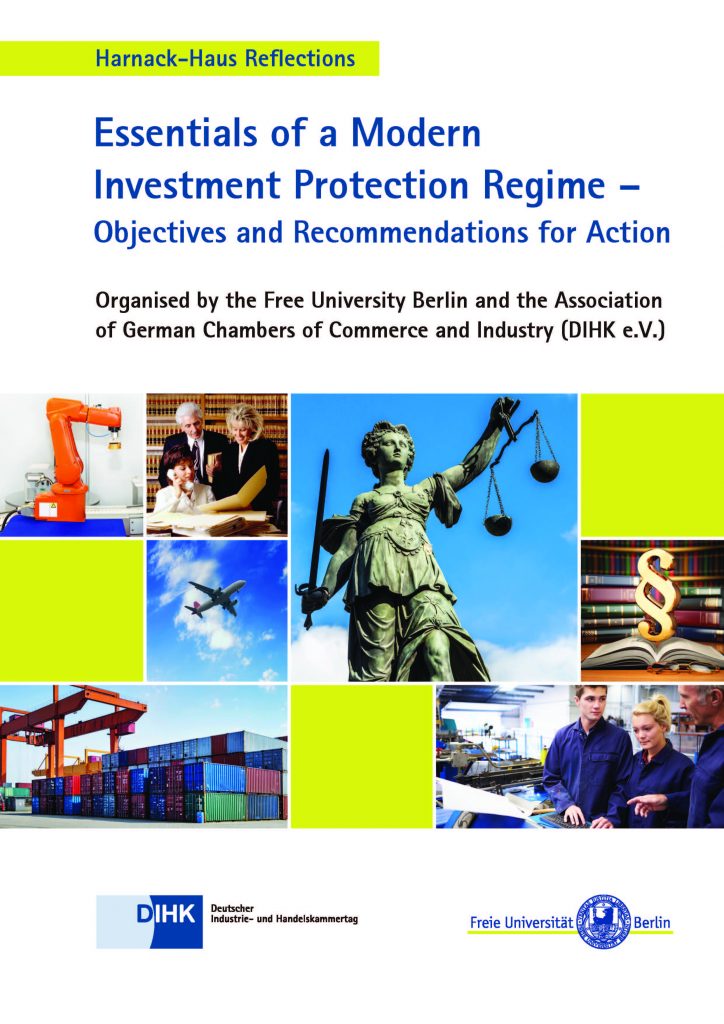Essentials of a Modern Investment Protection Regime – Objectives and Recommendations for Action


Abstract
Summary in Theses*
1. Investment Protection Agreements, including investor-to-state dispute settlement (ISDS) are a pillar of German foreign trade policy and pursue important goals and interests. These include in particular
- robust protection of German foreign investments, granted to small and large companies alike,
- strengthening of equal opportunities in competition in the respective market and thus the willingness to invest abroad,
- creating an incentive for good law-making and the maintenance or, alternatively, the development of a functioning legal system in the contracting parties as well as the emergence of uniform international legal standards that bring public and private interests in a reasonable balance,
- active promotion of German and European investments domestically and abroad; to this end also other market mechanisms and State investment guarantees should be used.
2. International investment law must preserve State regulatory sovereignty and bring public and private interests in an appropriate balance. This applies especially to the elaboration of the right to fair and
equitable treatment. In this context, the protection of legitimate expectations is to be incorporated as a case group in a non-exhaustive catalogue of potential violations; the principle of proportionality
should be the means to create a reasonable balance of interests both regarding the right to fair and equitable treatment and in matters concerning expropriation.
3. There is a need for public international law to protect investments, buttressed by European Union law. International law protection standards and their application and regard by national law are
important. They contribute to the realization of fundamental principles such as the rule of law and, hence, are also of significance for small and medium-sized enterprises (SMEs) in their
international activities. The substantive provisions alone do not suffice, however; their procedural enforcement must also be guaranteed.
4. If domestic judicial systems are functioning and effective, this must be duly considered in the context of investor-to-state dispute settlement. This can be done in different ways: one option is to make the (at least partial) referral to domestic remedies a precondition for access to ISDS; the conditions should be defined as clearly as possible. An alternative option would be to consider in the course of the assessment of the merits of the case whether the investor has taken sufficient recourse to national law remedies. This could be possible, for example, under aspects of contributory negligence or within in
the overall calculation of damages.
5. The continued existence of international investment protection depends on the promotion, development and positive perception of the rule of law of this field. This includes, in particular, independence, impartiality and transparency concerning the selection of arbitrators, the dispute settlement process itself, and the publication of the award. This ensures that public and academic discussion and monitoring may be further developed.
6. The selection of arbitrators, especially the presiding arbitrator, must be made more transparent and open. Initially, in order to strengthen transparency, changes to the provisions governing
the composition of a tribunal are necessary. The neutrality and professional qualifications of each arbitrator should be the decisive selection criteria. This applies mutatis mutandis for the appointment of
judges to a possible permanent international investment court. Rosters, i.e. closed lists of arbitrators can be counterproductive. A complete ban of the possibility to work as an arbitrator and counsel would lead to a considerable reduction of potential arbitral candidates, thus endangering the system as a whole. Rather, the number of qualified, active arbitrators (or judges) must be increased significantly in order to prevent the system from being shaped by few. Furthermore, a stronger role of European arbitration institutions on a global scale is desirable.
* Statements in this summary as well as the document in its entirety do not necessarily reflect the position of each individual participant. In no way do the views in this paper reflect the views of the institutions represented by each participant, nor shall they be attributed to those institutions in any way.



